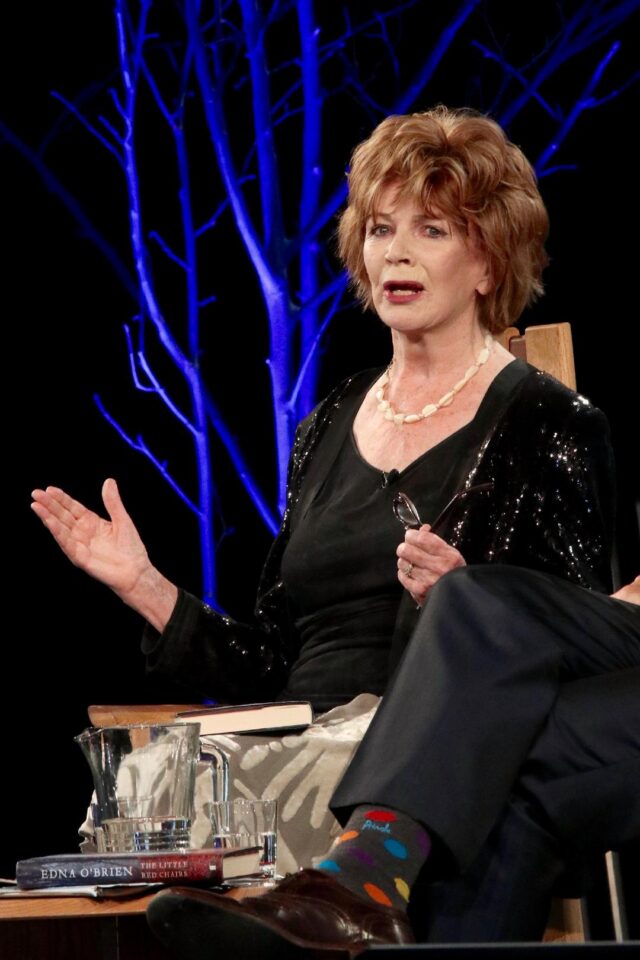“Rendezvous in Bangkok … Who Killed Thomas Merton,” written by Sabina Clarke and Thom Nickels, premiered in 2021. It’s back, revised, for a performance at the Commodore Barry Arts & Cultural Center (the Irish Center) Sunday, Sept. 22.
What follows is a transcript of an audio interview with Kirsten Quinn, who portrays Merton friend Joan Baez. She is also the casting director. Quinn is associated with several theater groups in the Philadelphia area, including, notably, The Irish Heritage Theatre, of which she is a board member.
Doors open at 2:30 p.m. The play begins at 3 p.m., followed by a Q&A.
Tickets are $20 and can be purchased at the door or in advance by calling 215-843-8051.
This recording is available, along with many other interviews, on Apple, Spotify, and wherever you get your podcasts under the heading, “Tea With Irish Philly.”
Irish Philadelphia:
This is your second opportunity to play Joan Baez, and I’m wondering what appeals to you about that character.
Kirsten Quinn:
I think that it’s a really interesting take on the character because in the play, it’s an imagined meeting, but in real life, they actually did meet Thomas Merton, who is the central focus of the play. I think Joan Baez were both obviously peace activists. They both called themselves nonviolent activists, so I thought it would be really interesting for me as an actor to portray a character from real life that looks very different from me and try to take on the qualities that she had and that she put forward both in her music and in her expression of her ideas and views. I’m excited to take a second stab at it.
Irish Philadelphia:
Just to be clear, this is, to some degree, an imagined relationship between Joan Baez and Merton, or is that an overstatement?
Kirsten Quinn:
Within the play, it is the conversation that they have in the play but in actuality, Joan and her friend, Ira Sandperl, they both met up with Thomas Merton because they had formed the Institute for the Study of Nonviolence in Carmel, California. They did use his writings as one of the foundations of their programming, and the essays and poems that he wrote were used at the Institute.
They did visit him in Gethsemane way back when they were much younger, but this is a recollection of Joan, and it’s after Merton has passed on in the play that she visits him and tries to warn him about his fate and what might happen to him. It is an imaginary sequence, but the two of them actually did meet in real life.
Irish Philadelphia:
What kind of challenges present themselves to you as an actor?
Kirsten Quinn:
I think that a lot of it has to do with the fact that she is a real person, that she’s historical figure, so studying her, studying her voice, studying her mannerisms in interviews, those are the challenges that I am facing with this. It’s a lot of fun to do that. How often do you get to portray someone from real life? I think that’s one of the things that draws me to this.
Irish Philadelphia:
She was really a controversial figure around that time. I’m trying to remember, there was a cartoonist who referred to as Joanie Phony.
Kirsten Quinn:
She was controversial because she was protesting against Vietnam and singing songs and writing songs. One of the songs that she wrote was Saigon Bride, which was against the Vietnam War. Yes, she was very controversial at that time, and Merton was too. There is the theory presented in the play that Merton was actually murdered and his death wasn’t an accident. She definitely was controversial.
Irish Philadelphia:
Why do you think the play received such positive feedback the first time around?
Kirsten Quinn:
I really thought that the writing of this play and the characters and the depth of characters and exploring history, maybe history that not many people are familiar with, I think all of those things contributed to the success of the show. I also thought that the actors did a great job of creating these characters and bringing them to life. There was only one performance, so it was a fairly large audience that came to see it and there were great reactions afterwards particularly to the script itself and of course, the performance.
Irish Philadelphia:
This might be a twist on Merton’s death that maybe some people haven’t heard about.
Kirsten Quinn:
Absolutely, absolutely. Sabina has done some rewrites on the scripts based on what she saw and what she heard from the audience and what she saw in working on the script and seeing it live and put up on a stage. I think it was really helpful to her in the revisions that she made for the play. I think that’s always the case when you do a workshop of a new play and you put it out there to an audience that that audience will influence the way in which you start to revise and rewrite.
Irish Philadelphia:
Do you think Merton’s death left questions unanswered and does this play answer them or is it just suggesting a possible answer?
Kirsten Quinn:
I think it’s more suggesting. I don’t want to answer for Sabina, but I do think that this is exploring that. Like you said, it’s not something that people really might know about, or that theory might be something that’s not quite understood or isn’t out there.
Irish Philadelphia:
So many years after his death, it might well be that a lot of people in the contemporary audience don’t really know much about this time or about his involvement.
Kirsten Quinn:
Exactly.
Irish Philadelphia:
Anything about this play resonates today?
Kirsten Quinn:
I think that the idea of taking a chance and standing up for your beliefs and not wavering from that, and there’s so much universally speaking that I think people can connect to with that idea of what they said. It wasn’t passive activism, it was nonviolent activism that we need that. We need grassroots activism, not just social media activism, but it’s bringing that to light and saying okay, call us to action. See what we can do.
Certainly, the politics of this time surrounding the upcoming election, the divisiveness, the way in which throughout time, throughout history and all over the world, certainly now, there is war, there is conflict. Even within our own country, there’s such a division that we do have the responsibility to really take that risk, take the chances in some ways that Merton and Baez and the other folks that were living at that time take their chances so that we can arrive at more of a peaceful world. Now obviously, that’s not… It’s an unrealistic thing, but that idealism can really spur real change.
Irish Philadelphia:
Of course, there’s a lot of division over Palestine right now. What’s going on with that and all the protests around that makes me think, and not just me, about all the protests surrounding the Vietnam War.
Kirsten Quinn:
Absolutely. There are definite parallels for sure.
Irish Philadelphia:
You’re also the casting director. What appealed to you about that?
Kirsten Quinn:
I am. I work for a company called the Irish Heritage Theater and so I have really a large pool of talent that I’ve worked with over the years with them. I love the fact that I can bring actors in for Sabina that maybe we haven’t worked with in a while at IHT, but also that are perfect for these roles and well-suited because it is a large cast, so that’s something that I like to do because it’s not that often that we, in theater companies, nowadays anyway, are casting large plays, especially small theater companies.
Irish Philadelphia:
You have actors coming over from the theater group?
Kirsten Quinn:
I do. I have some actors that have worked with Irish Heritage Theater in the past, we have some new actors, actors that we’ve never worked with before, some of whom are new to the area. We have folks that are students that are coming in, students from… I work at the Community College of Philadelphia that are coming in to do the reading. That’s really exciting to me to be able to introduce student actors to more seasoned actors and performers and to give folks a chance to do something really different, something new.
Irish Philadelphia:
I understand there’s going to be a Q&A. Are you going to be involved in that?
Kirsten Quinn:
I probably will be. I’m not sure. I would imagine that Sabina might want me to be part of it since we did work closely together in the casting of the show, hopefully.
Irish Philadelphia:
Okay. I’m very grateful for the time. I really appreciate your talking to me about this, and I’m looking forward to seeing it.
Kirsten Quinn:
Oh, it should be great. I’m really looking forward to doing the show again. I should also mention, because I didn’t mention this before, that Thomas Merton, that the official cause of death was a natural cause, sudden heart failure. But the possible cause of death was additional electrocution, and then now in this play, there’s the exploration of possible murder. That’s exciting to look at with this play.
Irish Philadelphia:
Oh, yeah. There are a lot of things that could cause that particular cause of death.
Kirsten Quinn:
Yes. It’s going to be a little bit of a mystery, so I’m excited to explore that mystery.


